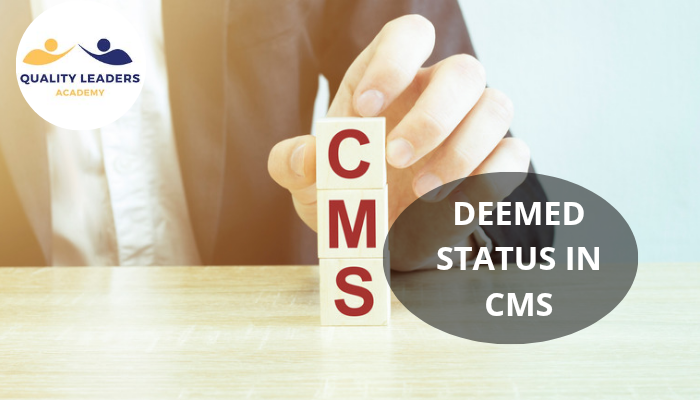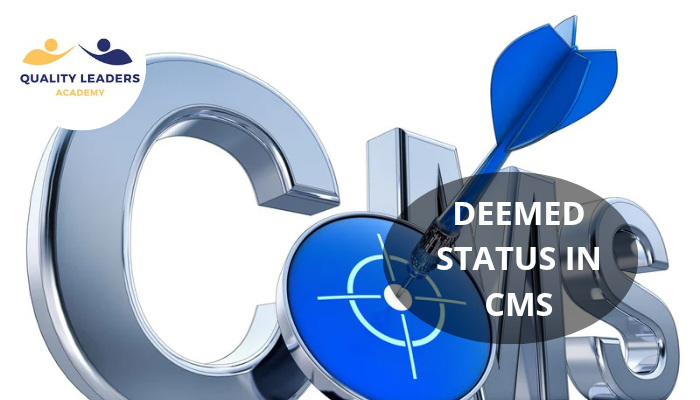Deemed Status in CMS is a concept within the healthcare system that significantly affects how healthcare organizations qualify for participation in Medicare and Medicaid programs. Managed by the Centers for Medicare & Medicaid Services (CMS), deemed status allows certain accredited healthcare organizations to bypass the direct CMS survey process. In essence, it is a streamlined recognition process whereby healthcare providers accredited by CMS-approved organizations automatically meet the conditions of participation required by CMS.
In this article, we will explore what deemed status means, the process for obtaining it, and its implications for healthcare providers.
WHAT IS DEEMED STATUS IN CMS?

Deemed Status refers to the recognition granted to healthcare organizations by CMS, where an accreditation from an approved accrediting body is considered to fulfill CMS’s requirements for participation in Medicare and Medicaid programs. This means that a healthcare organization does not need to undergo CMS’s regular survey process if it is already accredited by an entity recognized by CMS. The accreditation confirms that an organization complies with CMS’s health and safety standards, ensuring it meets the requirements to provide quality care to patients. This recognition demonstrates that the organization adheres to regulatory standards designed to protect patient well-being.
THE ROLE OF CMS-APPROVED ACCREDITING ORGANIZATIONS
To understand the deemed status, it is crucial to recognize the role of CMS-approved accrediting organizations. These organizations are responsible for evaluating healthcare providers based on the quality of care and operational standards they adhere to. Some of the most well-known CMS-approved accrediting bodies include:
- The Joint Commission (TJC): A leading organization that accredits hospitals, clinics, and other healthcare facilities.
- The National Committee for Quality Assurance (NCQA) is focused on accrediting health plans and practices, ensuring they meet standards for patient care and quality.
- The Accreditation Association for Ambulatory Health Care (AAAHC): specializes in accrediting outpatient care facilities and ambulatory health practices, emphasizing high standards for safety and patient care in these settings.
These organizations conduct rigorous surveys and reviews of healthcare providers, ensuring they meet national quality standards in patient care, safety, and facility operations.
THE PROCESS OF OBTAINING DEEMED STATUS IN CMS
For a healthcare organization to achieve deemed status, the following steps are typically involved:
Accreditation by a CMS-Recognized Body:
The healthcare provider must first obtain accreditation from an organization that CMS recognizes. The accrediting body must meet the standards and protocols outlined by CMS.
Meeting CMS’s Conditions of Participation:
By its accreditation, the healthcare organization is deemed to meet the CMS standards for participation in Medicare and Medicaid programs. These conditions include quality of care, patient safety, and operational integrity.
Periodic Surveys and Audits:
Even after receiving deemed status, healthcare providers are still subject to occasional surveys and audits by the accrediting body. These surveys ensure that the organization continues to meet CMS’s standards and requirements.
Documentation and Reporting:
While the healthcare provider may not need a direct CMS survey, it must still adhere to various documentation requirements and be open to random audits by CMS or the accrediting organization.
BENEFITS OF DEEMED STATUS
The primary benefit of deemed status is the significant reduction in administrative burden for healthcare providers. Instead of undergoing CMS’s extensive survey process, organizations can rely on the results of their accrediting body’s survey, which is aligned with CMS standards. This enables healthcare organizations to shift their focus from the complexities of CMS regulations to prioritizing patient care. By meeting accreditation standards, they can reduce administrative burdens, allowing more resources to be dedicated to improving patient outcomes and enhancing overall healthcare services.
Other key benefits include:
- Faster Access to CMS Participation:
Achieving deemed status allows healthcare providers to quickly access funding from Medicare and Medicaid programs. This is particularly beneficial for hospitals, clinics, and other healthcare facilities that rely heavily on these programs for their operations.
Streamlined Accreditation Process:
Healthcare organizations benefit from the streamlined accreditation process by only undergoing surveys from their accrediting organization, rather than CMS. This helps reduce the time and resources spent on compliance, allowing providers to focus on improving patient care and operational efficiency. Meeting accreditation standards helps reduce administrative burdens, ultimately improving healthcare delivery.
Ongoing Support for Quality Improvement:
Accrediting organizations offer healthcare providers valuable resources and guidance to foster ongoing improvements in care quality. This ensures a continuous cycle of quality enhancement, leading to better patient outcomes. These organizations help maintain high standards and encourage practices that elevate patient care over time.
THE CHALLENGES OF DEEMED STATUS
While deemed status offers several benefits, healthcare organizations must also be mindful of the challenges that come with it. Some of the challenges include:
Maintaining Accreditation Standards:
Once granted deemed status, the organization must continuously meet the high standards set by the accrediting body and CMS. Failing to maintain these standards could result in the loss of deemed status, which would have significant financial and operational implications.
Survey Variability:
The thoroughness and quality of surveys conducted by various accrediting bodies can differ based on their individual standards and assessment methods. While CMS approves these bodies, not all accrediting organizations are equal in terms of the rigor of their surveys, which may affect the consistency of quality standards across the healthcare system.
Cost of Accreditation:
Achieving and maintaining accreditation from an approved body can be expensive for healthcare providers, particularly for smaller organizations. The cost of surveys, training, and quality improvement efforts can strain an organization's budget.
CMS’S IMPACT ON HEALTHCARE PROVIDERS WITH DEEMED STATUS

For healthcare providers, deemed status can significantly impact their operational efficiency and access to funding. By meeting CMS’s standards through accreditation, these organizations demonstrate their commitment to high-quality patient care and compliance with federal regulations.
CMS’s endorsement of deemed status ensures that healthcare providers meet national standards for safety, quality, and patient care. This also helps foster greater transparency in healthcare, enabling patients to make more informed decisions about where to seek care.
Key Takeaways
- Deemed Status simplifies the regulatory process for healthcare providers, reducing the need for repeated CMS surveys.
- Healthcare organizations must first obtain accreditation from an approved accrediting body to qualify for deemed status.
- The process offers significant benefits, including quicker access to CMS funding, ongoing support for quality improvement, and a reduced administrative burden.
- Providers must maintain high standards of care to retain their deemed status and continue participating in CMS programs.
For healthcare organizations, deemed status serves as an essential pathway to CMS funding, providing a simplified and efficient process for achieving compliance with federal standards. However, providers must stay committed to maintaining accreditation and meeting the high-quality standards set by CMS-approved accrediting bodies.
For healthcare professionals seeking to improve their understanding of CMS regulations and quality management, Quality Leaders Academy offers comprehensive courses, including CPHQ certification, that cover the principles of healthcare quality, regulatory compliance, and case management. These courses can support organizations in maintaining their deemed status and achieving ongoing improvements in patient care.
For more details, consider exploring Quality Leaders Academy’s offerings, which include in-depth training on regulatory requirements and quality assurance in healthcare.
Read also:
HOW TO GET THE CPHQ CERTIFICATION
Resources:
https://www.ncbi.nlm.nih.gov/books/NBK597359/
https://www.jointcommission.org/resources/news-and-multimedia/fact-sheets/facts-about-federal-deemed-status/



